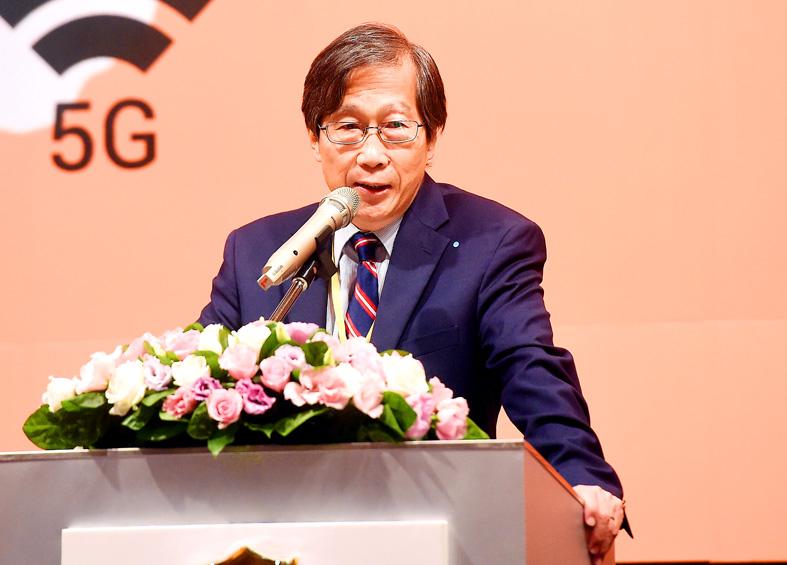US lawmakers’ passage of a bill that aims to ensure the country’s leadership in the Indo-Pacific region shows growing anti-China sentiment in the US Congress, a researcher said on Friday.
The US House Foreign Affairs Committee on Thursday passed the Ensuring American Global Leadership and Engagement Act (EAGLE Act), which contains several provisions regarding the US’ diplomatic and economic ties with Taiwan.
“There is this anti-China sentiment there, which is driving members of the US Congress to explore every type of option to strengthen ties with Taiwan,” said Arthur Ding (丁樹範), professor emeritus in National Chengchi University’s Graduate Institute of East Asia Studies.

Photo: Chien Jung-fong, Taipei Times
The act calls for an expansion of the US-Taiwan trade relationship, urges action to promote Taiwan’s participation in international organizations and calls for starting negotiations on renaming Taiwan’s representative office in the US to the “Taiwan Representative Office in the United States.”
The Taiwan International Solidarity Act — which was incorporated into the EAGLE Act — states that the UN’s recognition of the People’s Republic of China as the sole representative of China makes no determinations about Taiwan’s sovereignty or its representation at the UN.
“The renaming of Taiwan’s representative office in the US in particular must be addressed, because the current name — the Taipei Economic and Cultural Representative Office — does not sound political in nature,” Ding said. “The current name reduces Taiwan’s status to that of Hong Kong.”
Former minister of foreign affairs Chen Chien-jen (程建人) said the bill shows that US-China relations have hit a new low.
“However, this has also resulted in many Taiwan-friendly voices within the US Congress to emerge,” he said.
The US recognizes China’s rise as a challenge and threat to its interests, which provided the impetus for creating the EAGLE Act, he said, adding that any law aimed at China would unavoidably touch upon Taiwan.
“However, things like renaming the representative office are sensitive subjects, and it remains to be seen whether the US administration will act upon the clauses of this act,” he said.
Nevertheless, support for Taiwan at different levels of the US government and society is a welcome sight, he said.
The EAGLE Act needs to be reviewed by the full House before being put to a vote in both chambers of Congress and being signed into law by the US president.
Additional reporting by CNA

A decision to describe a Chinese Ministry of Foreign Affairs statement on Singapore’s Taiwan policy as “erroneous” was made because the city-state has its own “one China policy” and has not followed Beijing’s “one China principle,” Deputy Minister of Foreign Affairs Tien Chung-kwang (田中光) said yesterday. It has been a longstanding practice for the People’s Republic of China (PRC) to speak on other countries’ behalf concerning Taiwan, Tien said. The latest example was a statement issued by the PRC after a meeting between Singaporean Prime Minister Lawrence Wong (黃循財) and Chinese President Xi Jinping (習近平) on the sidelines of the APEC summit

Taiwan’s passport ranked 34th in the world, with access to 141 visa-free destinations, according to the latest update to the Henley Passport Index released today. The index put together by Henley & Partners ranks 199 passports globally based on the number of destinations holders can access without a visa out of 227, and is updated monthly. The 141 visa-free destinations for Taiwanese passport holders are a slight decrease from last year, when holders had access to 145 destinations. Botswana and Columbia are among the countries that have recently ended visa-free status for Taiwanese after “bowing to pressure from the Chinese government,” the Ministry

‘SIGN OF DANGER’: Beijing has never directly named Taiwanese leaders before, so China is saying that its actions are aimed at the DPP, a foundation official said National Security Bureau (NSB) Director-General Tsai Ming-yen (蔡明彥) yesterday accused Beijing of spreading propaganda, saying that Chinese President Xi Jinping (習近平) had singled out President William Lai (賴清德) in his meeting with US President Joe Biden when talking about those whose “true nature” seek Taiwanese independence. The Biden-Xi meeting took place on the sidelines of the APEC summit in Peru on Saturday. “If the US cares about maintaining peace across the Taiwan Strait, it is crucial that it sees clearly the true nature of Lai and the ruling Democratic Progressive Party (DPP) in seeking Taiwanese independence, handles the Taiwan question with extra

HEALTHCARE: Following a 2022 Constitutional Court ruling, Taiwanese traveling overseas for six months would no longer be able to suspend their insurance Measures allowing people to suspend National Health Insurance (NHI) services if they plan to leave the country for six months would be abolished starting Dec. 23, NHIA Director-General Shih Chung-liang (石崇良) said yesterday. The decision followed the Constitutional Court’s ruling in 2022 that the regulation was unconstitutional and that it would invalidate the regulation automatically unless the NHIA amended it to conform with the Constitution. The agency would amend the regulations to remove the articles and sections that allow the suspension of NHI services, and also introduce provisional clauses for those who suspended their NHI services before Dec. 23, Shih said. According to